
Blade Runner is a 1982 science fiction film directed by Ridley Scott from a screenplay by Hampton Fancher and David Peoples. Starring Harrison Ford, Rutger Hauer, Sean Young, and Edward James Olmos, it is an adaptation of Philip K. Dick's 1968 novel Do Androids Dream of Electric Sheep? The film is set in a dystopian future Los Angeles of 2019, in which synthetic humans known as replicants are bio-engineered by the powerful Tyrell Corporation to work on space colonies. When a fugitive group of advanced replicants led by Roy Batty (Hauer) escapes back to Earth, burnt-out cop Rick Deckard (Ford) reluctantly agrees to hunt them down.

Do Androids Dream of Electric Sheep? is a 1968 dystopian science fiction novel by American writer Philip K. Dick. It is set in a post-apocalyptic San Francisco, where Earth's life has been greatly damaged by a nuclear global war. The main plot follows Rick Deckard, a bounty hunter who has to "retire" six escaped Nexus-6 model androids, while a secondary plot follows John Isidore, a man of sub-par IQ who aids the fugitive androids.
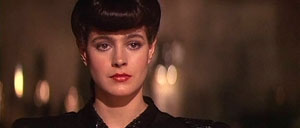
A replicant is a fictional bioengineered humanoid featured in the 1982 film Blade Runner and the 2017 sequel Blade Runner 2049 which is physically indistinguishable from an adult human and often possesses superhuman strength and intelligence. A replicant can be detected by means of the fictional Voight-Kampff test in which emotional responses are provoked; a replicant's nonverbal responses differ from those of a human. Failing the test leads to execution, which is euphemistically referred to as "retiring".
John C. "Jay" Cocks Jr. is an American film critic and screenwriter. He is a graduate of Kenyon College. He was a critic for Time, Newsweek, and Rolling Stone, among other magazines, before shifting to screenplay writing.
David Webb Peoples is an American screenwriter who co-wrote Blade Runner (1982), and later wrote Unforgiven (1992), and 12 Monkeys (1995). He has been nominated for Oscar, Golden Globe, and BAFTA awards. He won the best screenplay awards from the L.A. Film Critics (1991) and National Society of Film Critics (1992) for Unforgiven.
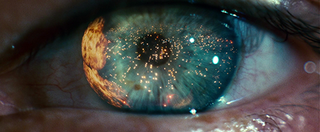
Despite the initial appearance and marketing of an action film, Blade Runner operates on an unusually rich number of dramatic levels. As with much of the cyberpunk genre, it owes a large debt to film noir, containing and exploring such conventions as the femme fatale, a Chandleresque first-person narration in the Theatrical Version, the questionable moral outlook of the hero—extended here to include even the literal humanity of the hero, as well as the usual dark and shadowy cinematography.
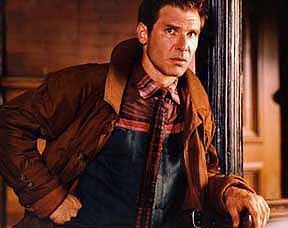
Rick Deckard is a fictional character and the protagonist of Philip K. Dick's 1968 novel Do Androids Dream of Electric Sheep?. Harrison Ford portrayed the character in the 1982 film adaptation, Blade Runner, and reprised his role in the 2017 sequel, Blade Runner 2049. James Purefoy voiced the character in the 2014 BBC Radio 4 adaptation.
Michael Almereyda is an American film director, screenwriter, and film producer.

Joe Walker is a British film editor who has worked in both England and Los Angeles. In 2022, he won the Academy Award for Best Film Editing for his work on Dune, having been nominated twice before for 12 Years a Slave and Arrival. For the American Cinema Editors Award for Best Edited Feature Film – Dramatic he has received a string of six nominations and in 2016 he won, for Arrival. He has received five nominations for a BAFTA Film Award for Best Editing. He took the European Film Award for Best Editor for Shame in 2012 and Satellite Award for Best Editing for Sicario in 2016.

Blade Runner 2049 is a 2017 American epic neo-noir science fiction film directed by Denis Villeneuve from a screenplay by Hampton Fancher and Michael Green, based on a story by Fancher. A sequel to Blade Runner (1982), the film stars Ryan Gosling and Harrison Ford, with Ana de Armas, Sylvia Hoeks, Robin Wright, Mackenzie Davis, Dave Bautista, and Jared Leto in supporting roles. Ford and Edward James Olmos reprise their roles from the previous film as Rick Deckard and Gaff, respectively. Gosling plays K, a "blade runner" who uncovers a secret that threatens to destabilize society and the course of civilization.

Mackenzie Rio Davis is a Canadian actress. She made her feature film debut in the drama film Smashed (2012). In 2013, she appeared in the film The F Word, for which she received a Canadian Screen Award nomination for Best Supporting Actress. From 2014 to 2017, she starred as computer programmer Cameron Howe in the AMC period drama series Halt and Catch Fire.
Benjamin Mark Lasker Wallfisch is a British composer, conductor, and producer—known for his work on film scores. He has contributed to over 50 feature films since the mid-2000s, including notable works like Blade Runner 2049, Shazam!, It, It Chapter Two, The Invisible Man, Hidden Figures, A Cure for Wellness, The Flash, Twisters, Alien: Romulus, and Kraven the Hunter.
Blade Runner is an American cyberpunk media franchise originating from the 1968 novel Do Androids Dream of Electric Sheep? by Philip K. Dick, featuring the character of Rick Deckard. The book has been adapted into several media, including films, comics, a stage play, and a radio serial. The first film adaptation was Blade Runner, directed by Ridley Scott in 1982. Although the film initially underperformed at the American box office, it became a cult classic, and has had a significant influence on science fiction. A novelization and a comic adaptation of the film were released in the same year. From 1995 to 2000, three novels serving as sequels to both Blade Runner and the original novel were written by K. W. Jeter, a friend of Dick's. A film sequel to Blade Runner, Blade Runner 2049, was released in 2017. To celebrate the 30th anniversary of Blade Runner in 2012, a short film was released, and in the lead up to the release of Blade Runner 2049, several more short films detailing events that occurred between 2019 and 2049 were released. The influence of the franchise has helped spawn the cyberpunk subgenre.

2036: Nexus Dawn is a 2017 American short film acting as a prequel to the feature film Blade Runner 2049. It is one of three such prequels, alongside Blade Runner Black Out 2022 and 2048: Nowhere to Run. The short was released on August 30, 2017, approximately five weeks before the release of the feature film, and features Jared Leto as Blade Runner 2049 character Niander Wallace, alongside Benedict Wong. The film was written by Hampton Fancher and Michael Green, who also wrote the feature film, and directed by Luke Scott, whose father Ridley Scott directed the original Blade Runner and is executive producer on the sequel Blade Runner 2049.
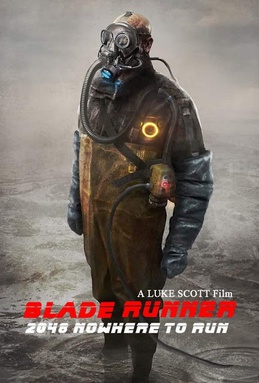
2048: Nowhere to Run is a 2017 American tech noir short film acting as a prequel to the feature film Blade Runner 2049 and the sequel to the short film 2036: Nexus Dawn. It is one of three such prequels, alongside Blade Runner Black Out 2022 and 2036: Nexus Dawn. The short was released on September 16, 2017, approximately three weeks before the release of the feature film, and features Dave Bautista as Blade Runner 2049 character Sapper Morton, alongside Orion Ben. The film was written by Hampton Fancher and Michael Green, who also wrote the feature film, and directed by Luke Scott, whose father Ridley Scott directed the original Blade Runner and is executive producer on the sequel Blade Runner 2049.

Blade Runner 2049 – Original Motion Picture Soundtrack is the soundtrack album for the 2017 film Blade Runner 2049. Released in October 2017, the album contains music composed by Hans Zimmer and Benjamin Wallfisch, along with additional tracks by Elvis Presley, Frank Sinatra and Lauren Daigle. The soundtrack was produced by Michael Hodges, Kayla Morrison and Ashley Culp. It also includes the piece "Tears in the Rain", which was originally composed and performed by Vangelis, the composer of the original 1982 soundtrack Blade Runner.
The 16th Washington D.C. Area Film Critics Association Awards were announced on December 8, 2017.
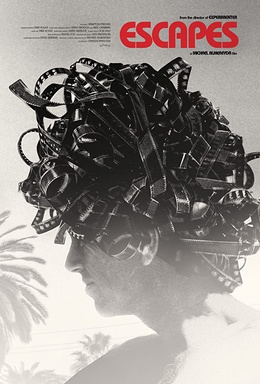
Escapes is a 2017 documentary film about the life of flamenco dancer, actor, and Blade Runner screenwriter Hampton Fancher directed by Michael Almereyda.












